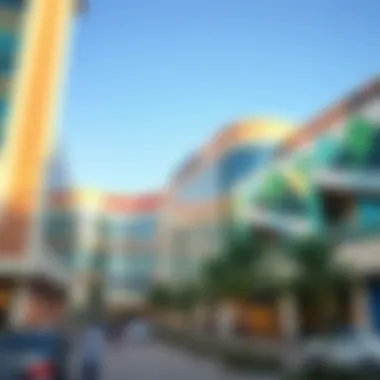Discovering Dubai's Latest Shopping Malls


Intro
Dubai continues to capture the world’s attention with its dazzling skyline and booming retail sector. Each year, the city welcomes an array of new malls, each trying to outdo the previous one in both design and offerings. These venues are not just shopping centers; they are symbols of social and economic evolution. As the city gears up to attract both tourists and businesspeople alike, understanding the latest mall developments is crucial for investors, retailers, and consumers.
Adventurous architects and designers have taken charge, bringing to life spaces that blend local culture with modern aesthetics. The shopping landscape is shaped not only by consumer demand but also by innovative strategies aimed at enhancing the shopping experience. This exploration dives deep into the latest malls in Dubai, dissecting their influence on local businesses, consumer behavior, and the tourism industry.
In a place like Dubai, where economic conditions can shift on a dime, knowing the market trends becomes essential for anyone eyeing potential investments or even casual shoppers wanting a unique retail experience. From the bustling activity of emerging neighborhoods to the intricacies of the mall architecture, nothing goes unnoticed in this riveting exploration.
The Evolution of Retail Spaces in Dubai
The retail environment in Dubai has undergone profound changes over the last few decades. This evolution isn’t merely about brick and mortar structures; it reflects changing consumer behaviors, shifting economic priorities, and the relentless push for innovation that Dubai is known for. Examining this evolution serves as a crucial framework for understanding the newly emerging malls, as they often build upon the lessons learned from past experiences while looking ahead to the future prospects.
Historical Context of Shopping Malls in Dubai
Dubai's journey in retail can be traced back to its early days when traditional souks lined the streets. These vibrant markets were not just places to shop; they were cultural hotspots, bustling with life, where barter and trade thrived. However, as tourism and population growth surged, the need for more modern and spacious shopping venues became apparent.
By the late 20th century, the first shopping malls began to emerge. The opening of the Dubai Mall in 2008 marked a pivotal point in Dubai’s retail history. It wasn't just a mall; it was a spectacle — a giant space featuring hundreds of stores, an aquarium, and even an ice rink. This development signaled the shift from traditional shopping experiences to a more comprehensive and luxurious consumer journey. As requirements changed, malls became multi-functional hubs where shopping, leisure, and entertainment coexisted.
Modern Trends in Mall Development
Today's malls in Dubai are no longer just about shopping; they are about creating environments tailored to experience. Here are some modern trends steering this evolution:
- Experiential Retail: Malls are increasingly prioritizing experiences over mere transactions. Retailers are transforming their spaces into interactive showrooms where consumers can engage with products.
- Integration of Technology: Smart technologies are making their way into malls, from augmented reality experiences to personalized shopping assistants. This tech-savvy approach caters especially to younger, more digitally inclined shoppers.
- Focus on Sustainability: With a growing commitment to environmental awareness, newly designed malls are incorporating sustainable practices, from energy-efficient building materials to eco-friendly waste management systems.
- Mixed-Use Developments: Malls are embracing mixed-use developments, integrating residential, commercial, and recreational spaces. This trend not only enhances consumer footfall but also makes them more indispensable in local community life.
As the retail landscape continues to evolve, these modern trends not only redefine the shopping experience but also solidify the role of malls as vital nodes in Dubai’s economy and culture. Understanding these dynamics equips investors, realtors, and potential tenants with the insights necessary for navigating this ever-changing marketplace.
Overview of New Mall Developments
The development of new malls in Dubai represents more than just a construction boom; it marks a shift in the retail landscape, adapting to the evolving demands of consumers and global trends. Dubai is known for its opulence and luxury, but recent years have seen a push towards a diverse shopping environment that includes local businesses and innovative concepts. This section delves into the crucial aspects of new mall developments, emphasizing their importance in contributing to economic growth, enhancing consumer experience, and redefining social spaces.
Key Players in the Retail Sector
In the bustling world of Dubai's retail sector, several heavyweight players are shaping the future landscape. The key companies include Majid Al Futtaim, Emaar Malls, and Al-Futtaim Group. Each of these groups has unveiled ambitious plans, with new flagship stores and innovative experiences that cater to both luxury seekers and everyday shoppers.
- Majid Al Futtaim is recognized for its expansive portfolio that includes City Centre malls across the UAE and the introduction of new brands to the market. This firm emphasizes creating family-friendly environments that merge leisure with retail.
- Emaar Malls, part of the Emaar Properties umbrella, has made a name through the iconic Dubai Mall. Their commitment to luxury shopping is visible through the enhancements planned for their existing spaces as well as new developments.
- Al Futtaim Group is another crucial player, known for integrating retail and residential developments, exemplifying the blend of living and shopping spaces, thus catering to a broader audience.
Their collective efforts in merging technology, sustainability, and an improved shopping experience mark a turning point in the way consumers interact with retail spaces.
Flagship Malls Opening Soon
As Dubai embraces a future teeming with opportunities, several flagship malls are set to open soon, promising to shake up the retail scene. Each of these malls brings forth unique elements that serve to elevate the shopping experience, tailored to cater to both locals and international visitors.
Location and Accessibility
Location is a primary factor in the success of any retail establishment. The upcoming malls are strategically located near major residential areas and transportation links including Dubai Metro stations and busy highways.
For instance, the new mall opening in Al Quoz is positioned close to the Expo 2020 site, making it a prime access point for both visitors and locals. What makes this location advantageous is its connectivity: visitors can navigate easily without being caught in notorious traffic jams, ensuring a steady flow of foot traffic.
Such accessibility not only enhances convenience for shoppers but also boosts surrounding businesses by increasing proximity to potential customers.
Architectural Innovations
The architectural designs of these malls are nothing short of revolutionary, showcasing a blend of aesthetic appeal and practical functionality. Malls are increasingly focusing on sustainability, with many featuring solar panels, green roofs, and water management systems.
For example, the new project in Jumeirah is designed with open-air spaces that harness natural light, creating a refreshing atmosphere for shoppers. The innovative layouts also encourage social interaction, where customers can enjoy cafes and relaxation areas seamlessly integrated into the shopping experience.
These design choices represent a shift towards sustainable and user-friendly environments, promoting an engaging retail experience that caters to modern sensibilities while considering environmental impact.
Unique Selling Propositions


Distinct identity is what sets these new malls apart in a saturated market. The unique selling propositions of each mall often focus on offering experiences that go beyond traditional shopping. For example, some are incorporating entertainment options like indoor skate parks, cinemas, and even art galleries.
The forthcoming mall in Downtown Dubai aims to provide a holistic lifestyle experience, combining fashion, food, and fitness within its walls. Highlighting local artisans and crafts in dedicated sections allows for cultural engagement, making it a destination rather than just a stopping point.
These unique propositions not only attract shoppers seeking variety but also add value to the retail ecosystem, fostering community ties and supporting local economy.
"Dubai's new malls are not merely about shopping; they represent a forward-thinking approach to consumer experience, blending lifestyle and leisure with retail."
Architectural Highlights of New Malls
The architectural features of new malls in Dubai serve a pivotal role, transforming mere shopping destinations into iconic landmarks. With a cityscape already rich in modern design, these new malls borrow elements from nature and culture while integrating cutting-edge technology. The result is a harmonious blend that not only captivates visitors but also elevates the overall retail experience.
Design Philosophy and Inspiration
When talking about design philosophy, it’s vital to note that each mall doesn't just aim for aesthetic appeal but also functional excellence. Inspired by elements like local heritage and global trends, these structures often incorporate traditional Arab influences. For instance, one might notice intricate mashrabiya screens that not only offer shade but also allow for air circulation, creating a comfortable atmosphere for shoppers.
Moreover, the layout of these malls often reflects a thoughtful connection between indoor and outdoor spaces. As an example, the design of Mall of the Emirates features generous skylights that flood common areas with natural light, presenting an uplifting environment that encourages social interaction.
The idea is to create more than just a shopping haven; it’s about establishing a lifestyle hub where people come together, whether it's to shop, dine, or simply relax. The importance of understanding this philosophy is crucial for investors, as the aesthetic and functional appeal can directly impact foot traffic and overall profitability.
Sustainability Practices in Mall Design
Sustainability is a hot topic, and for a good reason. New malls in Dubai are not only concerned with stunning architecture; they are also setting an example in eco-friendly design. A substantial number of these retail spaces are integrating sustainability practices into their designs to meet the growing demand from environmentally conscious consumers. This includes utilizing energy-efficient lighting, rainwater harvesting systems, and green roofs that support local biodiversity.
A standout example can be found in the design of The Dubai Hills Mall, which utilizes solar panels to reduce energy consumption. The intention is to not only minimize environmental impact but also appeal to a demographic that values responsible business practices.
Incorporating green spaces into these malls creates inviting outdoor areas, whereby visitors can unwind in a leafy environment. This attention to sustainability can also offer economic benefits, as it can potentially lower operational costs in the long run.
"Sustainable design is no longer a luxury; it's a necessity that can enhance value in today's market."
Culmination
Architectural highlights are more than just visual elements; they reflect a deeper narrative about cultural identity, sustainability, and the future of urban living. The focus on design philosophy creates spaces that resonate with people, while sustainable practices not only fulfill social responsibility but produce economic advantages. As Dubai continues to evolve, the architectural achievements in its new malls stand as testaments to innovation and foresight in the retail landscape.
Retail Offers and Consumer Experience
In the landscape of retail, the offering and the experience a consumer has are crucial. As Dubai embarks on a phase of expansive mall development, understanding how these aspects mold the shopping journey can help investors and stakeholders grasp the direction of the evolving retail market. The interplay between diverse retail selections, innovative experiences, and consumer engagement creates a unique atmosphere that draws people in. It's about more than just shopping; it's about creating memorable experiences that encourage customer loyalty and repeat visits.
Diverse Retail Mix
A broad retail mix is a cornerstone of any successful mall. It caters to different tastes and budgets, ensuring that everyone finds something appealing. The essence of this diversity can be explored through distinct categories:
Luxury Brands
The presence of luxury brands elevates a mall’s prestige and appeal. High-end retailers like Gucci or Louis Vuitton not only serve affluent consumers but also act as magnets that attract shoppers looking for an exclusive experience. The key characteristic of luxury brands is their reputation for quality and craftsmanship.
- Why is this beneficial? Having luxury options can enhance foot traffic in the mall, drawing in both local shoppers and tourists. It signals to other retailers that the mall is a serious player in the market.
- One unique feature is how these brands often offer personalized shopping experiences, such as personal shoppers or customization options, which can be a huge draw. However, the downside could be that such high-end offerings can alienate average consumers who may feel out of place in an upscale environment.
Local Artisans
On the flip side, local artisans contribute to a mall's vibrancy and authenticity. These small businesses provide unique, handcrafted products, like jewelry from local craftsmen or bespoke clothing. The key characteristic here is that they tell a story and often reflect the culture of the UAE.
- Why choose local? Shoppers are becoming increasingly interested in products that support local economies. This choice fosters a sense of community and identity within the shopping experience.
- A unique feature of these artisans is their ability to offer workshops or events, allowing shoppers to engage in the creation process. Nevertheless, one challenge is that local businesses may struggle against larger, established brands in terms of marketing and reach.
Technology-Enabled Retail
The integration of technology-enabled retail in malls is transforming shopping. Stores that leverage technology, like smart fitting rooms or mobile checkout systems, can enhance the consumer experience significantly. The essential trait of these stores is their focus on convenience and efficiency.
- The appeal in this tech-savvy age? Shoppers value streamlined processes, making technology-enabled retail a compelling option. This improves customer satisfaction and helps optimize sales processes.
- Unique features include augmented reality displays that allow customers to visualize products in their space before purchasing. However, reliance on technology can create barriers for those less familiar with digital interfaces, potentially widening the gap between different consumer demographics.
Innovative Shopping Experiences


Moving beyond the product mix, the shopping experience itself holds equal, if not more, importance. Malls are now becoming interactive spaces where engagement reigns supreme. This shift is notable through:
Interactive Installations
Today’s malls often feature interactive installations—these are engaging displays that invite participation rather than mere observation. From touch-screen kiosks to immersive art exhibits, these facets can enrich the consumer's journey. The unique characteristic of these installations lies in their ability to captivate and intrigue shoppers, fostering a deeper connection with the brand or product.
- Why are they beneficial? Such installations create buzz and can foster social media engagement, as visitors are likely to share their experiences online.
- A notable advantage is that they can limit the flow of foot traffic in crowded areas, allowing for a more enjoyable shopping experience, but they also require continuous updates to maintain interest.
Virtual Reality Shopping
One of the cutting-edge innovations shaking up retail is virtual reality shopping. This technology allows consumers to experience a virtual store from the comfort of their home, or even in the mall itself. Its key characteristic is the creation of a fully immersive shopping experience where physical boundaries no longer restrict purchasing options.
- Why is this a chosen path? The potential for convenience is immense. Consumers can explore a range of products in a virtual environment, thus reducing the need for physical space in the mall.
- The unique feature of VR is its ability to simulate experiences, such as trying on clothes or testing products before committing to a purchase. However, the tech can also present challenges, including the cost of implementation and a learning curve for users new to VR technology.
Impact on Local Economy
The introduction of new malls in Dubai has a broad impact on the local economy, acting as a catalyst for growth, job creation, and community engagement. As these shopping centers sprout across the city, they bring significant economic benefits that ripple through various sectors. Understanding this impact provides insights for investors, realtors, homeowners, expatriates, and renters who are keen to comprehend the evolving retail landscape.
Job Creation and Employment Opportunities
New malls are more than just places to shop; they are employment hubs. When a new mall opens its doors, it creates hundreds, if not thousands, of jobs. Positions range from retail management to customer service roles and warehouse staff. This diverse job creation can significantly reduce the unemployment rate in the area.
- Direct employment: The mall generates immediate jobs, including sales associates, security personnel, and maintenance staff.
- Indirect employment: Beyond direct roles, there are jobs connected to suppliers, logistical services, and even local eateries that thrive due to the increased foot traffic.
Moreover, the roles available are often targeted for differing skill levels, allowing not only experienced professionals but also young workers and students to find employment. This influx of jobs is vital, especially considering the diverse population of Dubai, where expatriates form a significant part of the workforce. It enhances skill development and improves job prospects within the community as individuals gain valuable experience and training.
Supporting Local Businesses
The economic advantages of new malls extend to local businesses, which can benefit tremendously from the increase in consumer traffic. Malls typically host a mix of international brands and local retailers, fostering a vibrant shopping environment that can help smaller businesses thrive.
- Collaborative opportunities: New malls often feature areas dedicated to local artisans and startups, offering them a platform to showcase their products. This not only boosts the local economy but also elevates the cultural uniqueness of the shopping experience.
- Cross-promotion: Local businesses can capitalize on the marketing efforts of larger retailers. With increased visibility through mall promotions and events, smaller businesses attract a wider audience, increasing their revenue.
- Community connections: Malls serve as a meeting point, encouraging community engagement and events that spotlight local culture, art, and cuisine. Festivals or markets organized within these spaces allow local vendors to reach consumers who might not typically seek them out.
"Malls can transform into community anchors, bridging gaps between local culture and global commerce."
In essence, the economic framework surrounding new malls in Dubai emphasizes synergy between large retailers and local enterprises. This interconnectedness fosters innovation and supports sustainable growth, crucial for maintaining a dynamic and robust economy. The impact of malls transcends mere shopping; it plays a critical role in the economic landscape of the city, setting the stage for future investments and developments.
Cultural Significance of New Retail Spaces
In the vibrant landscape of Dubai, the emergence of new malls signifies much more than just an expansion of retail options. They are becoming essential components of community life, blending commerce with culture, interaction, and shared experiences. The cultural significance of these new retail venues lies in their ability to foster community connections, offer diverse experiences, and enhance the urban fabric.
Malls in Dubai are evolving into community hubs. They serve as gathering spaces where residents and tourists alike can come together, socialize, and experience a range of cultural activities. These venues are not simply places to shop; they host events, exhibitions, and recreational activities that draw people from all walks of life. As these malls integrate local culture and traditions into their offerings, they are helping to nurture a sense of belonging and identity among Dubai's multicultural population.
Malls as Community Hubs
Malls function as social epicenters, bringing together families, friends, and strangers in one space. They adapt to the cultural dynamics of the city, offering not just shopping options but conducive spaces for leisure and recreation. For instance, many new malls in Dubai include children's play areas, outdoor parks, and even multi-use event spaces that cater to festivals and exhibitions. This shift has encouraged local engagement and provided a platform for community events, promoting interaction and collaboration.
Events and Entertainment Offerings
Food Festivals
Food festivals within new malls present a flavorful opportunity for cultural exchange. These events spotlight local delicacies and international cuisines alike, inviting patrons to explore a variety of gastronomic delights. By featuring local chefs and artisans, food festivals empower local businesses while enhancing the mall's role as a communal space.
The key characteristic of such festivals is their diversity; participants experience a colorful tapestry of foods that represent various cultures. This not only satisfies culinary curiosities but also fosters a spirit of togetherness through shared meals. Furthermore, food festivals can be a significant draw, attracting large crowds and providing local vendors with unmatched exposure. However, challenges such as logistical complexity and crowd management can arise, necessitating careful planning and execution to ensure they are successful and enjoyable events.
Art Exhibitions
Art exhibitions held in malls further augment their cultural significance by transforming retail spaces into platforms for creativity. These exhibitions enable local artists to showcase their work, providing visibility and fostering a deeper appreciation of the arts. They help elevate the mall beyond commerce, creating an environment where culture thrives alongside shopping.
Exhibitions can vary widely, from contemporary art displays to showcases of traditional crafts. The unique aspect of art exhibitions in retail spaces is their ability to attract diverse audiences – art lovers, shoppers, and curious tourists, all mingling together and sparking conversations. This can promote community engagement, yet it also presents the challenge of balancing a commercial atmosphere with a creative one.
Future Outlook of Malls in Dubai


As Dubai continues to establish itself as a retail paradise, the importance of understanding the future outlook of malls cannot be overstated. This section delves into anticipated trends and technological advancements that are expected to shape the future of shopping centers in this vibrant city.
Predicted Trends in Retail
The retail landscape in Dubai is ever-shifting, responding not only to consumer demands but also to global market dynamics. Here are some key trends to watch:
- Experiential Retail: Malls are evolving beyond just shopping hubs. The focus is shifting to experiences. Retailers are creating spaces that engage customers on a sensory level. Imagine a perfumery where patrons can create their own scent or an art gallery within a mall showcasing local talents.
- Health and Wellness: With an increasing focus on personal wellness, malls are likely to incorporate facilities like gyms and wellness centers, making healthy living more accessible. This trend could tie in with restaurants offering healthy menu options, creating a holistic wellness experience.
- Sustainability Initiatives: Conscious consumerism is on the rise. Shoppers are becoming more selective about where they spend their money, prompting malls to adopt sustainable practices. Think about malls that promote eco-friendly brands or have energy-efficient designs.
- Local Artisan Support: There's a growing demand for locally sourced products. Malls may set up dedicated spaces for local artisans, helping them reach a broader audience while enriching the shopping experience.
"As retail evolves, the next wave of malls will blend traditional shopping with community-centric concepts, fostering deeper connections."
Emerging Technologies in Shopping
Technology is likely to play a pivotal role in shaping how consumers interact with retail spaces in the future. Here are some innovations set to redefine the shopping experience:
- Augmented Reality (AR): Enhanced shopper experiences via AR could become commonplace. For instance, imagine being able to see how a piece of furniture would look in your living room simply by pointing your phone at a space in the mall.
- Cashless Transactions: The shift towards digital wallets and contactless payments is ongoing. Malls will likely facilitate this trend by enabling more seamless checkout experiences, reducing queues, and improving the overall shopper experience.
- Data Analytics: With sophisticated analytics tools, malls can offer personalized shopping experiences, tailoring promotions based on individual preferences through loyalty apps. This could also assist retailers in stock management, ensuring that popular items are always available.
- Smart Malls: Concepts such as smart parking systems, where sensors guide visitors to available spaces, and AI-driven customer service kiosks could become standard, making navigation and customer interaction smoother.
Understanding these trends and technologies will be crucial for all stakeholders in Dubai's retail sector—investors, retailers, and consumers alike. As these innovations take root, they promise to transform the landscape, making malls in Dubai more relevant and engaging than ever.
Investment Opportunities in New Malls
Investing in the new malls popping up across Dubai holds substantial potential, particularly for those looking to capitalize on the city's booming retail landscape. The importance of these investment opportunities cannot be overstated; they promise impressive returns while enhancing the evolving commercial fabric of the city. As Dubai continues to bolster its reputation as a global shopping destination, understanding the driving forces behind these developments becomes critical for savvy investors.
The new malls are not just retail spaces; they are envisioned as lifestyle hubs. Their design often includes a mix of entertainment, dining, and leisure offerings, which means consumers are more likely to spend their time and money within these complexes. This consumer behavior directly impacts rental rates and property values, offering a lucrative chance for investors.
Real Estate Investment Potential
When discussing real estate investment potential, it's invaluable to recognize the location of these new malls. For example, developers are more frequently choosing sites near major transport links like the Dubai Metro or popular tourist spots. This accessibility draws in both local shoppers and international tourists, solidifying the malls as prime investment avenues.
Investors looking for properties around newer developments such as Dubai Hills Mall or Dubai Square, for instance, can expect a competitive edge. The allure of these locations often results in high foot traffic, which is a cornerstone for any successful retail property. Furthermore, as Dubai's population grows, so does demand for commercial activities, making these malls critical players in the city's economic ecosystem.
Key factors to consider include:
- Projected Growth: Many reports indicate a steady increase in tourism and population, which positively affects retail performance.
- Market Trends: Understanding shifting consumer preferences towards experiential shopping environments can guide investment decisions.
- Diversification: The mix of international brands and local businesses reduces risk, promising a rounded shopping experience that attracts a broader audience.
Strategic Insights for Investors
To navigate the intricate maze of the Dubai retail scene, investors must consider various strategic insights. The landscape is competitive, but with the right approach, one can uncover opportunities that others might miss.
- Engage with Locals: Building relationships with local entrepreneurs can provide tenants for retail spaces, ensuring that the malls reflect consumer needs and desires.
- Leverage Technology: As technology continues to evolve, investors should look for malls integrating digital platforms, be it through mobile apps for customer engagement or optimized logistics for retailers. Malls aligning with tech trends are more likely to stay relevant.
- Participate in Community Events: Engaging malls in community activities not only boosts footfall but also establishes lasting relationships with consumers. This can enhance brand loyalty for businesses located within the malls.
- Stay Informed about Regulatory Changes: Dubai’s real estate landscape can shift, so being abreast of new regulations or incentives for foreign investors can create a significant advantage.
Investing in new malls within Dubai isn't just about purchasing property; it's about understanding the nexus of culture, economics, and consumer trends. Successful investors are those who appreciate the larger picture while focusing on intricate details.
As the landscape continues to mature, those keen on seizing these investment opportunities in UAE's vibrant market will find themselves well-positioned for future successes. The fusion of modern design, cultural significance, and burgeoning demand lays the groundwork for a prosperous retail environment.
Final Thoughts on Dubai's Retail Landscape
As we reflect on the dynamics reshaping Dubai's retail scene, it's crucial to recognize how emerging malls are not merely structures of commerce but rather symbols of cultural and economic evolution. These establishments signify a blend of modernity amidst tradition and serve as catalysts for broader societal changes. The landscape of retail in Dubai is becoming more than a marketplace; it's becoming a social phenomenon that impacts a wide array of stakeholders, from casual shoppers to serious investors.
Summarizing the Mall Experience
The mall experience today goes beyond just shopping. It's a multifaceted journey that captivates visitors with varied attractions, luxurious environments, and culinary delights. Malls such as The Dubai Mall and Mall of the Emirates are trendsetters, featuring not only retail outlets but also experiential layers that engage all senses.
- Retail Diversity: Visitors can find luxury brands alongside local boutiques. This mix caters to both high-end consumers and shoppers on a budget, creating inclusivity.
- Culinary Exploration: Food courts in these new malls are becoming gourmet hubs, offering both traditional Emirati dishes and international cuisine. Local restaurateurs are using these venues to showcase the richness of Arabic culinary art, which attracts both residents and tourists.
- Entertainment: More than mere shopping, these malls integrate entertainment options such as cinemas, gaming zones, and family-friendly activities. The aim is to keep the foot traffic high and create a destination feeling.
- Social Connectivity: Malls act as gathering places where families can spend quality time, meet friends, or enjoy community events. This aspect plays a crucial role in sustaining consumer interest, making shopping a leisure activity rather than a chore.
Overall, the mall experience embodies a confluence of shopping, culture, and leisure that caters to the needs of a fast-paced lifestyle in Dubai. This mixture makes them vital contributors not only to the retail sector but also to community engagement.
The Role of Malls in Dubai's Future
Looking ahead, the future of malls in Dubai is likely to continue evolving as they adapt to new consumer behaviors and technological advancements. As shopping preferences shift and people seek more meaningful engagements, malls will have to rethink their approaches.
- Integration of Technology: The incorporation of augmented reality and virtual reality into shopping is already emerging. This shift will redefine how consumers interact with products and brands, enriching the shopping experience.
- Sustainability Measures: Future developments will see a keen focus on environmentally friendly practices. From energy-efficient designs to waste reduction, malls will increasingly reflect global sustainability trends, meeting the demands of conscious consumers.
- Cultural Integration: As Dubai positions itself as a global city, new malls will serve as platforms to showcase local art, culture, and fashion, marrying international allure with local identity. This dual narrative will enhance the mall's appeal to both international tourists and residents alike.
- Socio-Economic Impact: Malls are poised to remain key economic drivers, attracting both local and foreign investments. With well-planned locations and facilities designed to cater to diverse demographics, these spaces will continue to create job opportunities and boost the local economy.
In essence, the future of malls in Dubai is one of adaptation and growth, driven by technology, sustainability, and cultural resonance. Their continuing evolution will play a significant role in not just the retail sector but also in nurturing community ties and fostering a vibrant social fabric that embodies the Dubai spirit.
"The shopping mall has become a community hub, acting as a microcosm of the diverse cultural landscape that defines Dubai."
Through understanding and embracing these changes, stakeholders such as investors, realtors, and even consumers, will find unique opportunities to thrive in this ever-changing retail environment.



